Office of Research
GRA Eminent Scholars
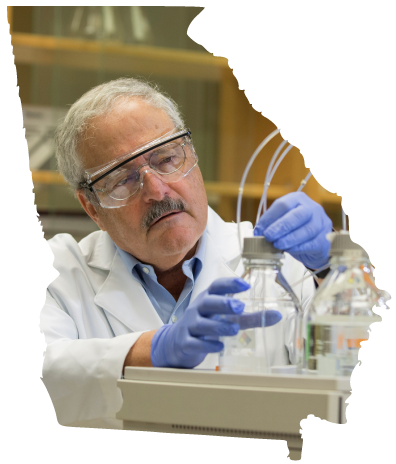
Great Commitments, Great Faculty
Georgia Research Alliance Eminent Scholars and GRA Distinguished Investigators are acknowledged leaders in areas of science that are strategically important to the state of Georgia and its research universities. Their distinctions are made possible by the Georgia Research Alliance, a unique nonprofit that grows Georgia’s economy by expanding university research and entrepreneurship. GRA’s investment and involvement generate more discoveries, more startup companies and more high-value jobs in Georgia. The public-private alliance invests State of Georgia funds, and its operations are supported by corporations, individuals and foundations.
Working with their colleagues across the university, GRA Eminent Scholars and Distinguished Investigators have helped the University of Georgia rise 41% in research and development expenditures from fiscal year 2013 to 2021.
18
2
Georgia Research Alliance
Eminent Scholars at
the University of Georgia
Georgia Research Alliance
Distinguished Investigators at
the University of Georgia
GRA Eminent Scholars
Jeffrey Bennetzen
Molecular Biology and Functional Genomics
C. Robin Buell
Crop Genomics
David Crich
Drug Design
Roberto Docampo
Emerging Diseases and Cellular Biology
Arthur Edison
Nuclear Magnetic Resonance Spectroscopy
Robert Haltiwanger
Biomedical Glycoscience
Gerald Hart
Drug Discovery
Anumantha Kanthasamy
Parkinson’s Research
Dennis Kyle
Antiparisitic Drug Discovery
Robert Maier
Microbial Physiology
Karen Norris
Immunology and Translational Biomedicine
James Prestegard
Magnetic Resonance Spectroscopy, Emeritus
Ted Ross
Infectious Diseases
Steven Stice
Regenerative Medicine
Ralph Tripp
Vaccine and Therapeutic Studies
Chung-Jui “C.J.” Tsai
Forest Biotechnology
Bi-Cheng Wang
Structural Biology
Ying Xu
Bioinformatics
GRA Distinguished Investigators
GRA Eminent Scholars
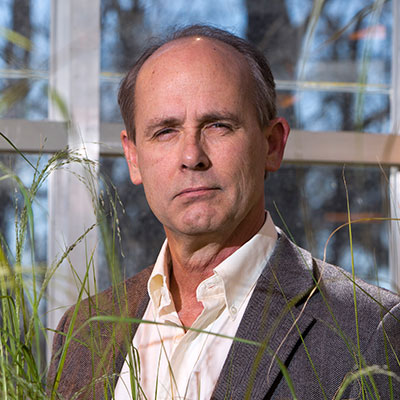
JEFFREY BENNETZEN
Norman and Doris Giles/GRA Eminent Scholar in Molecular Biology and Functional Genomics
Year Recruited: 2003 | Previous Institution: Purdue University
Bennetzen is translating insights about the genomes of cereals and other grasses into knowledge that can increase crop yields for food and biofuels. His discoveries include the genetic basis of why plant genomes vary more than 1,000-fold in DNA content, which is known as the C-value paradox. His honors include two Fulbright Awards, a Guggenheim Fellowship and election to the National Academy of Sciences.
Research contributions:
- Cloned and sequenced the first transposable elements from plants
- Created the first genetic map of sorghum
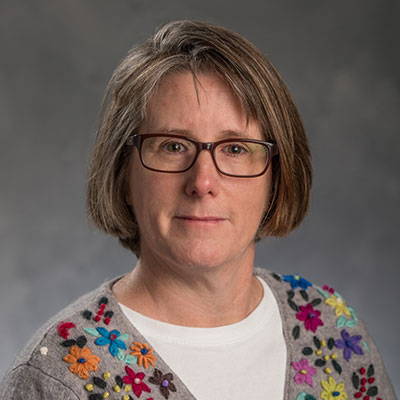
C. ROBIN BUELL
GRA Eminent Scholar in Crop Genomics
Year Recruited: 2021 | Previous Institution: Michigan State University
Buell is an international leader in plant genomics research, sequencing the DNA of key crops and identifying adaptations to improve food, bioenergy and pharmaceutical production. She is the principal investigator for several genomic projects, including Potato 2.0, which seeks to genetically modify the plant to help farmers better meet the needs of consumers and society.
Research contributions:
- Principal investigator on the Institute for Genomic Research team that in 2005 published the genome sequence of rice–the first crop plant genome sequenced
- Worked on genomes of Arabidopsis, potato, maize, switchgrass, sweet potato, mints and medicinal plants

DAVID CRICH
GRA Eminent Scholar in Drug Design
Year Recruited: 2019 | Previous Institution: Wayne State University
Crich is pursuing the design of novel aminoglycoside antibiotics for the treatment of ESKAPE pathogens, six bacterial pathogens commonly associated with multidrug resistance. He aims to expand into carbohydrate-based areas, developing glycomimetics—therapeutic agents that mimic carbohydrates—for use in drug design.
Research contributions:
- Developed new glycosylation methods and is known for seminal contributions to the elucidation of the principles of reactivity and selectivity
- Co-founded the biotech startup Juvabis AG to develop next-generation antibiotics for the treatment of multidrug resistant infectious diseases
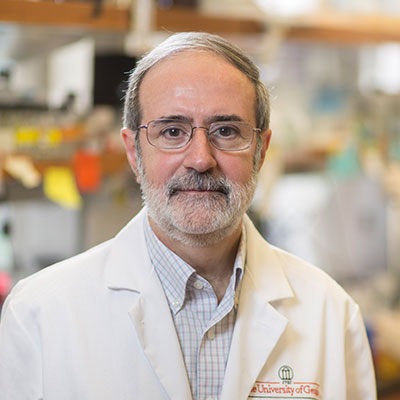
ROBERTO DOCAMPO
Distinguished Research Professor
Barbara and Sanford Orkin/GRA Eminent Scholar in Emerging Diseases and Cellular Biology
Year Recruited: 2005 | Previous Institution: University of Illinois Urbana-Champaign
Docampo is developing new therapies to treat parasitic diseases such as sleeping sickness. His lab has identified a specific cellular process within the parasite that can be disrupted and is now using this knowledge to develop drugs that attack the parasite without harming the human host.
Research contributions:
-
Discovered that the parasite that causes Chagas disease is susceptible to a common class of antifungal compounds
-
Discovered a previously unknown organelle that is a promising drug target
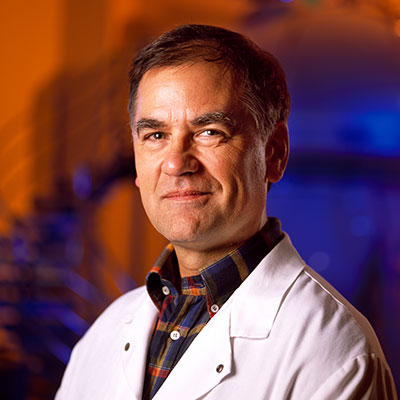
ARTHUR EDISON
GRA Eminent Scholar of Nuclear Magnetic Resonance Spectroscopy
Year Recruited: 2015 | Previous Institution: University of Florida
Edison has pioneered new techniques and instrumentation to advance the field of metabolomics, which is focused on small molecules called metabolites that are essential to life.
Metabolomics has the potential to give scientists the ability to obtain a comprehensive snapshot of a person’s health, opening up new avenues for diagnosing illnesses.
Research contributions:
-
Developed new approaches for the identification of metabolites and established a large center for metabolomics
-
Illuminated the role that small metabolic products play in communication among animals
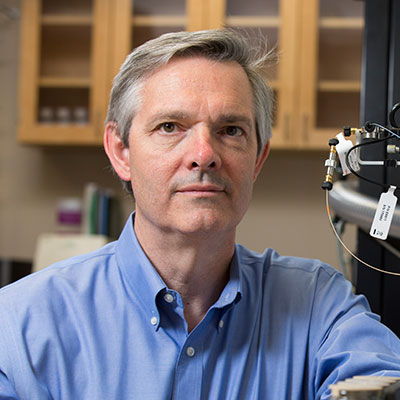
ROBERT HALTIWANGER
GRA Eminent Scholar in Biomedical Glycoscience
Year Recruited: 2015 | Previous Institution: Stony Brook University
Haltiwanger is shedding light on how cells communicate and applying this knowledge to the development of new drugs. His work has led to the identification of several novel drug targets, and he and his colleagues are now applying their research to cancer, congenital heart defects and other developmental disorders.
Research contributions:
-
Discovered several novel drug targets for cancer and developmental disorders
-
Identified important roles for complex carbohydrates in communication between cells
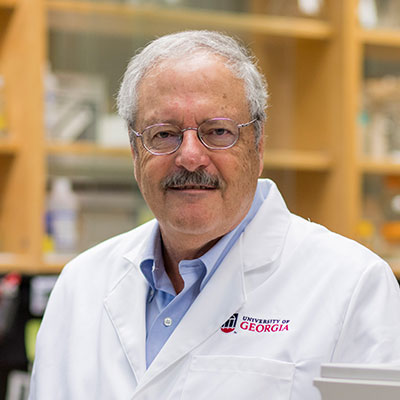
GERALD HART
William Henry Terry Sr./GRA Eminent Scholar in Drug Discovery
Year Recruited: 2018 | Previous Institution: Johns Hopkins University
Hart and his colleagues discovered a unique sugar that is attached to many proteins and alters their function in response to nutrients and blood glucose levels. Later studies revealed that this complex carbohydrate plays a role in diabetes, cancer and degenerative diseases such as Alzheimer’s. Hart and his team are currently working to translate this knowledge into improved diagnostic tests.
Research contributions:
-
Discovered a complex carbohydrate involved in diabetes, cancer and neurodegenerative diseases
-
Developed a new early detection method for diabetes

ANUMANTHA KANTHASAMY
John H. “Johnny” Isakson Chair/GRA Eminent Scholar in Parkinson’s Research
Year Recruited: 2021 | Previous Institution: Iowa State University
Kanthasamy investigates the molecular and cellular mechanisms that contribute to neural degeneration in Parkinson’s and other neurological diseases. His work has explored the role of neurotoxins in cell death processes, seeking relationships between the environment, genetics and disease progression. Kanthasamy has founded two startup companies to commercialize drug candidates and biomarkers identified in his research. At UGA, he is establishing a research center for brain science and neurological disorders.
Research contributions:
-
Identified novel signaling mechanisms, therapeutic targets and biomarkers for Parkinson’s disease and other related neurological diseases
-
Connected the pesticides and metals exposure to key pathological mechanisms associated with neural degeneration
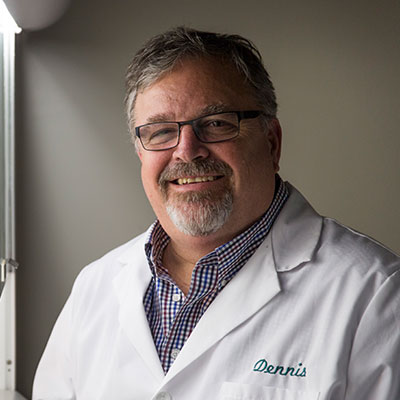
DENNIS KYLE
GRA Eminent Scholar in Antiparasitic Drug Discovery
Director, Center for Tropical and Emerging Global Diseases
Year Recruited: 2017 | Previous Institution: University of South Florida
Kyle is one of the world’s top experts on malaria and other parasitic diseases, and his research is fueling the discovery of powerful new medicines. He also discovered a new way to grow human liver cells in the laboratory, enabling more effective testing of malaria drug candidates.
Research contributions:
-
Identified two promising new anti-malarial drugs as part of international teams
-
Developed two new drug candidates to treat brain-eating amoebae infections
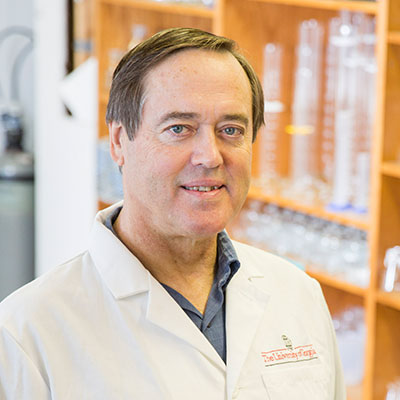
ROBERT J. MAIER
Ramsey/GRA Eminent Scholar in Microbial Physiology
Year Recruited: 1998 | Previous Institution: Johns Hopkins University
Maier has shown that some human pathogenic bacteria, including some associated with cancers, are able to use hydrogen produced as a consequence of normal intestinal flora as an energy source for growth. His lab is now working to understand how pathogens survive in this harsh environment, with the goal of identifying potential drug targets.
Research contributions:
-
Discovered that H. pylori, which causes 90% of all gastric cancers, can use hydrogen as an energy source
-
lluminated the processes that bacteria use to metabolize hydrogen
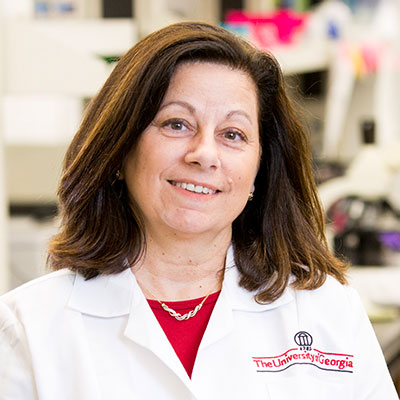
KAREN NORRIS
Charles Wheatley Chair/GRA Eminent Scholar in Immunology and Translational Biomedicine
Year Recruited: 2016 | Previous Institution: University of Pittsburgh
Norris’ work is focused on the mechanisms of opportunistic infections, which pose serious risks to people with weakened immune systems. In addition to informing new vaccines and therapies, her research also is yielding new knowledge on how the natural aging process, as well as chronic diseases such as HIV, can weaken the immune system.
Research contributions:
-
Led the development of a vaccine to protect against Pneumocystis pneumonia
-
Established animal models for Pneumocystis pneumonia, chronic obstructive pulmonary disease and pulmonary arterial hypertension
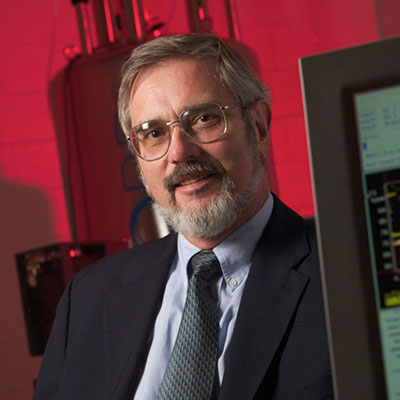
JAMES PRESTEGARD
GRA Eminent Scholar in Magnetic Resonance Spectroscopy, Emeritus
Year Recruited: 1998 | Previous Institution: Yale University
An essential part of developing any new drug is determining how that drug will bind to the protein it is targeting, a process that begins with characterizing the structures and shapes of interacting molecules. Prestegard is a leader in using nuclear magnetic resonance (NMR) spectroscopy to do exactly that.
Research contributions:
-
Developed new NMR-based methods that extend the range of applicability of the technology
-
Revealed new insights into membrane- and carbohydrate-linked proteins that regulate cellular interactions

TED ROSS
GRA Eminent Scholar in Infectious Diseases
Director, Center for Vaccines and Immunology
Year Recruited: 2015 | Previous Institution: Vaccine and Gene Therapy Institute of Florida
Ross is leading a 15-institution team from around the country in a National Institutes of Health initiative to develop a new, more advanced influenza vaccine designed to protect against multiple flu strains with a single dose. Awarded in September 2019 and supported by up to $130 million over seven years, the project will focus initially on those populations most vulnerable to flu infection, including small children, the elderly and the immuno-compromised.
Research contributions:
-
Developed technology to design vaccine candidates against influenza, dengue and HIV
-
Pioneered the use of C3d, a component of the innate immune system, to boost the effectiveness of vaccines

STEVEN STICE
GRA Eminent Scholar in Regenerative Medicine
Director, Regenerative Bioscience Center
Year Recruited: 1998 | Previous Institution: University of Massachusetts
Stice looks at the cells in his lab and imagines a hundred possible uses for them: repairing damaged tissue, detecting dangerous substances and creating disease-resistant animals, just to name a few examples. Stice has founded four Georgia companies to commercialize the technologies developed in his lab. Among them is ArunA Biomedical, which has developed proprietary neural exosomes that can be used to treat neurodegenerative diseases.
Research contributions:
-
Awarded the world’s first patent for therapeutic cloning from adult cells
-
First-to-market innovation: Methods of using exosomes for treatment of spinal cord injury, stroke and traumatic brain injury

RALPH TRIPP
GRA Eminent Scholar in Vaccine and Therapeutic Studies
Year Recruited: 2004 | Previous Institution: Centers for Disease Control and Prevention
Tripp is translating discoveries on immunity and pathogenesis into new treatments for respiratory diseases and new methods that speed vaccine development. His discoveries have led to the development of antiviral drugs for influenza as well as for RSV, a flu-like virus that can be fatal in young children and the elderly. He is the founder and chief scientific officer of two startup companies—Proventus Bio and Hypercell.
Research contributions:
-
Developed anti-viral drugs for influenza and RSV
-
Discovered new methods for augmenting vaccine expression
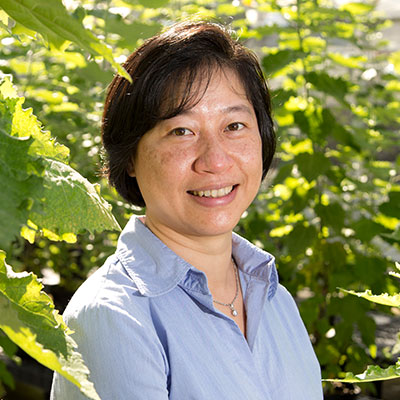
CHUNG-JUI “C.J.” TSAI
Winfred N. “Hank” Haynes/GRA Eminent Scholar in Forest Biotechnology
Year Recruited: 2008 | Previous Institution: Michigan Technological University
Tsai imagines a day when trees are a prime source of biofuel. To make that day a reality, she’s working to design better, hardier trees with higher biomass yields. Using modern genomic tools, she is mapping out ways to accelerate tree growth, make trees more drought resistant and spur them to produce more biomass.
Research contributions:
-
Pioneered the application of CRISPR genome-editing technology to forest trees
-
Identified genes that mediate how trees respond to stresses such as drought
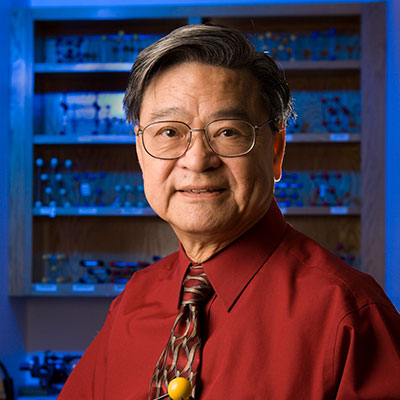
BI-CHENG WANG
Ramsey/Georgia Research Alliance Eminent Scholar in Structural Biology
Founding Director, SER-CAT
Year Recruited: 1995 | Previous Institution: University of Pittsburgh
Wang has transformed the field of X-ray crystallography and its use in drug development. He founded a consortium of 25 institutions known as SER-CAT (for Southeast Regional Collaborative Access Team) that has produced data on more than 3,900 protein structures that have been deposited in the Protein Data Bank.
Research contributions:
-
Developed more efficient and cost-effective techniques for X-ray crystallography
-
Part of teams that determined the protein structures of eukaryotic and prokaryotic model organisms C. elegans and P. furiosus
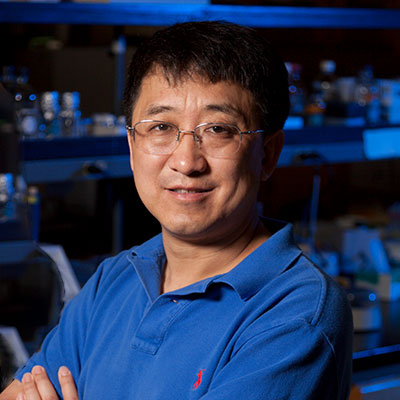
YING XU
Georgia Research Alliance Eminent Scholar in Bioinformatics
Year Recruited: 2003 | Previous Institution: Oak Ridge National Laboratory
Xu is a computational biologist who uses a portfolio of computational tools, such as the large-scale mining of biological data. Unlike most cancer researchers, who study cultures derived from cancerous cells, Xu and his team analyze genetic data derived from tissues. Their techniques have uncovered important information about how cancer begins.
Research contributions:
GRA Distinguished Investigators

David Bertioli
Georgia Research Alliance Distinguished Investigator in Plant Genetics
Bertioli studies peanut genetics, genomics and evolution. He works with breeding programs in the United States, Brazil, Senegal and Uganda to produce improved peanut cultivars with pest and disease resistance derived from wild peanut species.
Research contributions:

Georgia Research Alliance Distinguished Investigator in Glycobiology
Wells is an analytical biochemist who conducts fundamental research on the molecular causes of disease. He and his team investigate how sugars are added onto proteins—the micromachines of the human body—and the role this process plays in diseases such as congenital muscular dystrophy, intellectual disability and cancer, along with modulating virus entry into human cells.
Research contributions:
-
Elucidated the roles of many enzymes and glycan structures in congenital muscular dystrophy
-
First to biochemically characterize mutations in the gene OGT, which encodes a sugar transfer enzyme, that can cause intellectual disability
Georgia Research Alliance
By partnering with the state’s research universities, the Georgia Research Alliance helps recruit nationally and internationally recognized scientists in areas of strategic importance to the state of Georgia and its economy.
GRA also accelerates the launch and growth of university enterprises through its venture development program and invests in research-driven, Georgia-based startup companies through the GRA Venture Fund.
To learn more, visit gra.org
